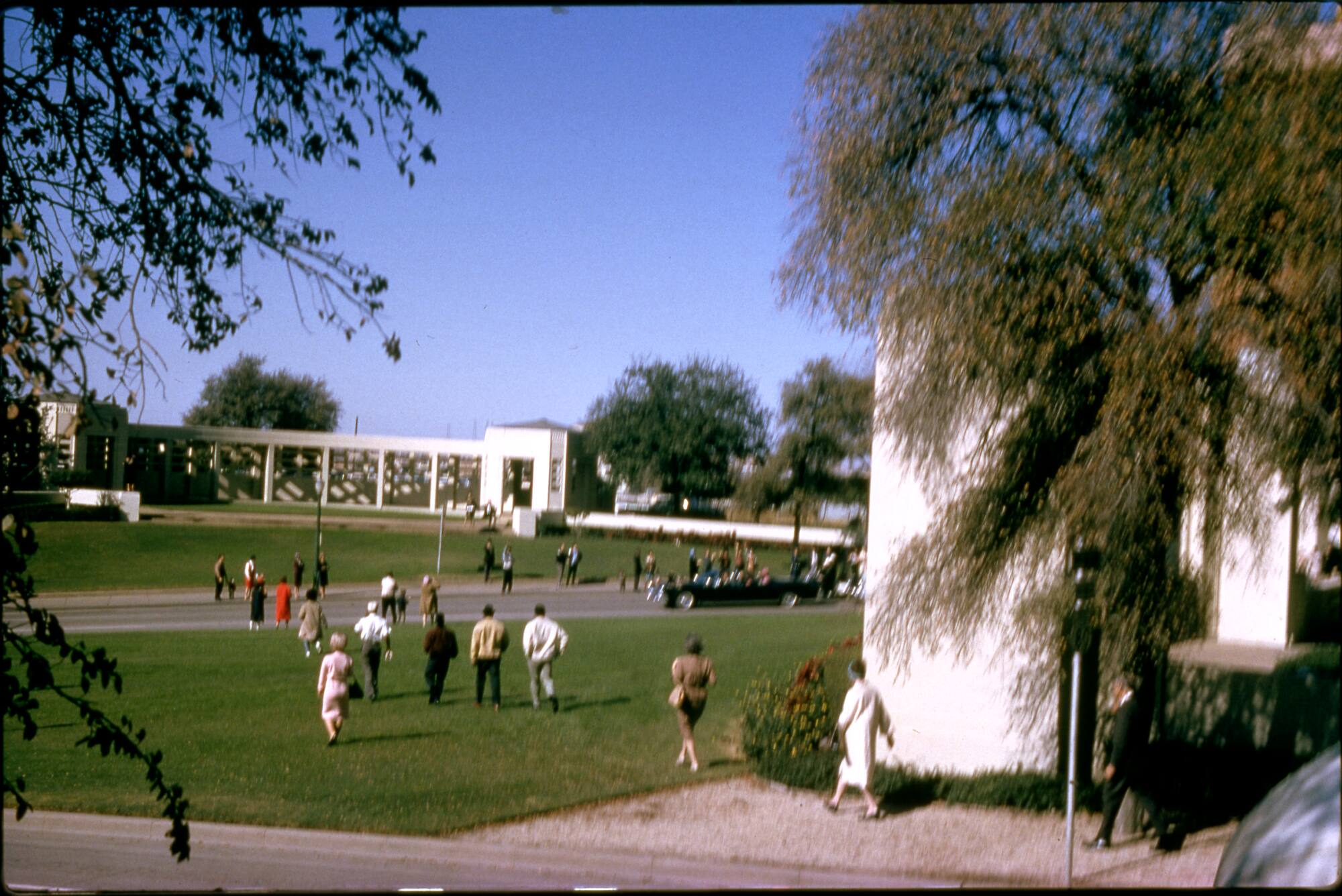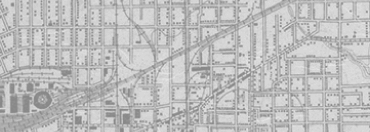


Back
Charles L. Bronson slide #3
Original 35mm color slide taken by Charles L. Bronson while standing on a pedestal in Dealey Plaza at the southwest corner of Main and Houston streets. This is the third of three still photographs taken on November 22, 1963, and the only one taken during the assassination. Bronson took two additional images in Dealey Plaza the following day.The image shows President John F. Kennedy's motorcade driving down Elm Street through Dealey Plaza on Friday, November 22, 1963. This image was taken at approximately the same time as frame Z229 of the Zapruder film. Mr. Bronson stood on the opposite side of Dealey Plaza from Abraham Zapruder. According to Mr. Bronson, the sound of the first shot caused him to instinctively jump and snap this photograph, which is why the image is slightly blurred. People are running and walking in the direction of Elm Street. Abraham Zapruder is visible along the left side of the image standing on the pedestal outside the pergola in Dealey Plaza. In addition, several other identifiable eyewitnesses are visible in this image. Slide copyrighted Charles L. Bronson 1978.
Charles L. Bronson slide #3
11/22/1963
Film
2 × 2 in. (5.1 × 5.1 cm)
Charles L. Bronson Collection/The Sixth Floor Museum at Dealey Plaza
2017.015.0005.0001
Forty-five-year-old Charles Bronson, chief engineer of Varel Manufacturing in Dallas, brought two cameras to Dealey Plaza on November 22, 1963: a Leica Model III for still photographs and a Keystone Olympic K-25 for color home movies. He and his wife, Frances, stood atop a concrete pedestal at the southwest corner of Main and Houston streets. Bronson had had a lifelong dream to see a president and was eager to capture images of President Kennedy during his visit to Dallas. Bronson's Leica, purchased in 1938, was the oldest known camera used in Dealey Plaza on the day of the assassination. It was loaded with daylight Kodachrome film. After taking two still photographs of the presidential limousine near and at the corner of Main and Houston streets - in between brief film sequences - Bronson waited with his Leica to take a third image of the Kennedy motorcade as it made its way down Elm Street. He had intended to wait until the limousine came into full view, but according to Bronson, the sound of the first shot startled him, causing him to jump and snap this slightly blurred image of the assassination in progress. This slide corresponds approximately with Zapruder frame 229. Immediately after taking this still image, Bronson once again raised his Keystone Olympic home movie camera and captured approximately two seconds of the assassination on film, including the fatal shot to President Kennedy. This remarkable still image provides the most panoramic perspective of Dealey Plaza during the Kennedy assassination. A number of eyewitnesses--including Abraham Zapruder, the Newman and Chism families, Charles and Joe Brehm, Jean Hill and Mary Moorman, and the controversial Babushka Lady and Umbrella Man figures--are all visible in this one photograph as the shooting takes place. - Stephen Fagin, Curator

Charles L. Bronson slide #3
Original 35mm color slide taken by Charles L. Bronson while standing on a pedestal in Dealey Plaza at the southwest corner of Main and Houston streets. This is the third of three still photographs taken on November 22, 1963, and the only one taken during the assassination. Bronson took two additional images in Dealey Plaza the following day.The image shows President John F. Kennedy's motorcade driving down Elm Street through Dealey Plaza on Friday, November 22, 1963. This image was taken at approximately the same time as frame Z229 of the Zapruder film. Mr. Bronson stood on the opposite side of Dealey Plaza from Abraham Zapruder. According to Mr. Bronson, the sound of the first shot caused him to instinctively jump and snap this photograph, which is why the image is slightly blurred. People are running and walking in the direction of Elm Street. Abraham Zapruder is visible along the left side of the image standing on the pedestal outside the pergola in Dealey Plaza. In addition, several other identifiable eyewitnesses are visible in this image. Slide copyrighted Charles L. Bronson 1978.
Charles L. Bronson slide #3
11/22/1963
Limousine
Motorcade
Assassination
Eyewitnesses
Photographer
Dealey Plaza
Main Street
Elm Street
Zapruder film
Kennedy, John F.
Kennedy, Jacqueline
Zapruder, Abraham
Bronson, Charles
Dallas
Film
2 × 2 in. (5.1 × 5.1 cm)
Charles L. Bronson Collection/The Sixth Floor Museum at Dealey Plaza
2017.015.0005.0001
Forty-five-year-old Charles Bronson, chief engineer of Varel Manufacturing in Dallas, brought two cameras to Dealey Plaza on November 22, 1963: a Leica Model III for still photographs and a Keystone Olympic K-25 for color home movies. He and his wife, Frances, stood atop a concrete pedestal at the southwest corner of Main and Houston streets. Bronson had had a lifelong dream to see a president and was eager to capture images of President Kennedy during his visit to Dallas. Bronson's Leica, purchased in 1938, was the oldest known camera used in Dealey Plaza on the day of the assassination. It was loaded with daylight Kodachrome film. After taking two still photographs of the presidential limousine near and at the corner of Main and Houston streets - in between brief film sequences - Bronson waited with his Leica to take a third image of the Kennedy motorcade as it made its way down Elm Street. He had intended to wait until the limousine came into full view, but according to Bronson, the sound of the first shot startled him, causing him to jump and snap this slightly blurred image of the assassination in progress. This slide corresponds approximately with Zapruder frame 229. Immediately after taking this still image, Bronson once again raised his Keystone Olympic home movie camera and captured approximately two seconds of the assassination on film, including the fatal shot to President Kennedy. This remarkable still image provides the most panoramic perspective of Dealey Plaza during the Kennedy assassination. A number of eyewitnesses--including Abraham Zapruder, the Newman and Chism families, Charles and Joe Brehm, Jean Hill and Mary Moorman, and the controversial Babushka Lady and Umbrella Man figures--are all visible in this one photograph as the shooting takes place. - Stephen Fagin, Curator









